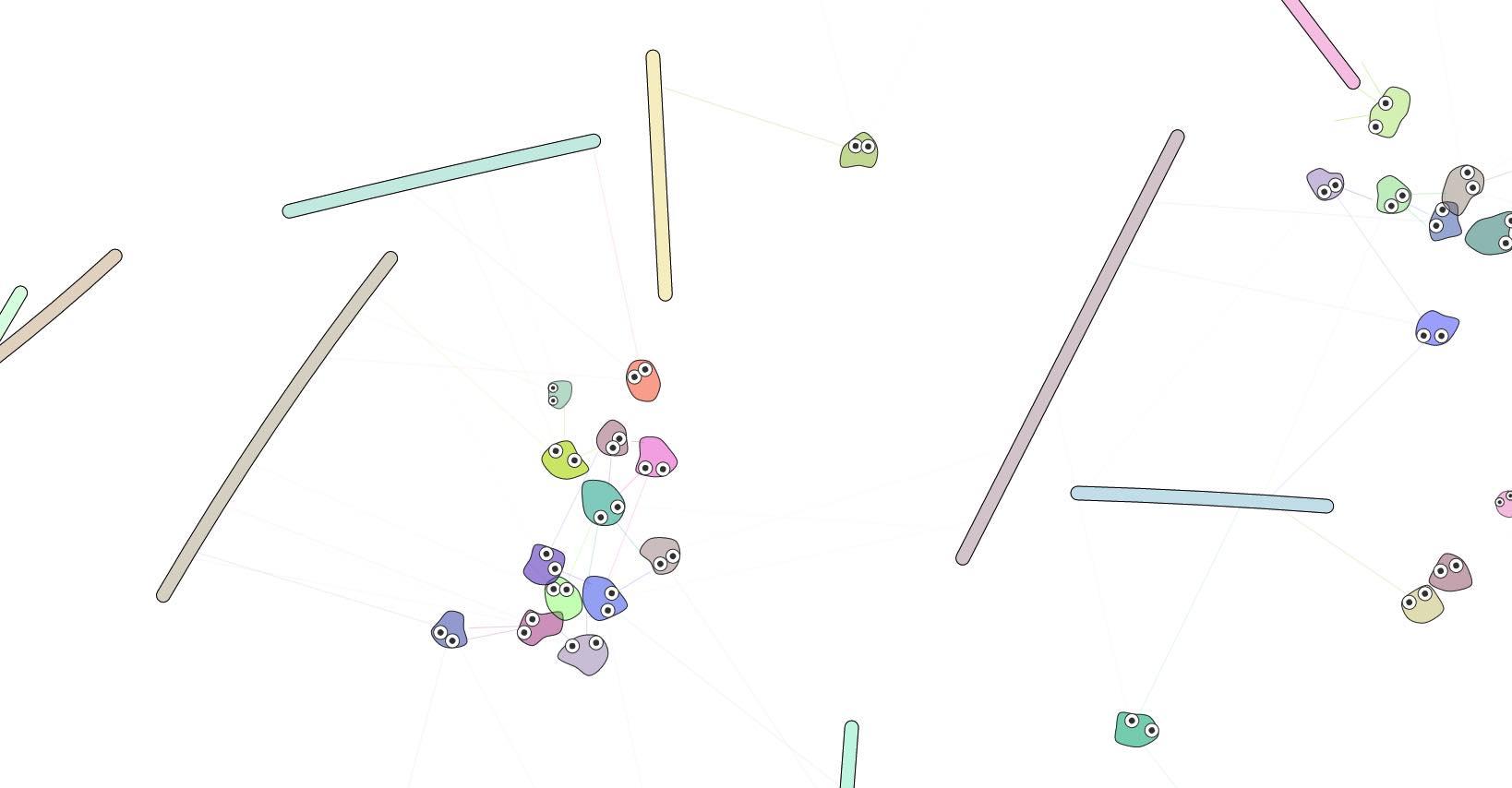“The avocado is highly regarded by many people as delicious and nutritious, but the most extraordinary thing about avocados may be their very existence.”
Avocados should not exist


“The avocado is highly regarded by many people as delicious and nutritious, but the most extraordinary thing about avocados may be their very existence.”


Creatures Avoiding Planks is a web toy demonstrating natural selection. Wee blobby creatures wander around avoiding floating planks, which kill on touch. If one lives long enough, it reproduces, passing on slight variations of its own movement behavior to the offspring.
The brilliant work of @hardmaru, I can't watch it anymore because I feel so sorry for them. Read the rest

Matt Ridley, author of The Red Queen and a Conservative member of the House of Lords, reflects on Richard Dawkins' groundbreaking book about evolution, The Selfish Gene, which was published 30 years ago.
From Nature:
Read the restThe origin of The Selfish Gene is intriguing. Dawkins revealed in the first volume of his memoirs, An Appetite for Wonder, that the idea of selfish genes was born ten years before the book was published. In 1966, the Dutch biologist Niko Tinbergen asked Dawkins, then a research assistant with a new doctorate in animal behaviour, to give some lectures in his stead. Inspired by Hamilton, Dawkins wrote in his notes (reproduced in An Appetite for Wonder): “Genes are in a sense immortal. They pass through the generations, reshuffling themselves each time they pass from parent to offspring ... Natural selection will favour those genes which build themselves a body which is most likely to succeed in handing down safely to the next generation a large number of replicas of those genes ... our basic expectation on the basis of the orthodox, neo-Darwinian theory of evolution is that Genes will be 'selfish'.”
Dawkins began writing the book in 1973, and resumed it in 1975 while on sabbatical. At the suggestion of Desmond Morris, the zoologist and author of The Naked Ape (Jonathan Cape, 1967), Dawkins showed some draft chapters to Tom Maschler of Jonathan Cape, who strongly urged that the title be changed to "The Immortal Gene." Today, Dawkins regrets not taking the advice.

Every year, like clockwork, longstanding Oklahoma legislators in the state's house and senate introduce bills that try to find a way around the prohibition on teaching Biblical Creationism in American public schools. Read the rest

In Cary Huang's evolution simulator, one first generates 1000 random geometrical beasties. Then one watches them iterate until equilibrium prevails, commanding the most successful to reproduce and decimating the failures. The measure of the monster is how far they can flop and wobble along in a simple a 2D landscape: most fail rather fast and hard.
(The game window will start out too large for the website: scroll down and click the "full screen" icon at the bottom of the window.)
The wireframe life forms remind me of an early and massively-overhyped "evolution simulator" called Eco, released in the late 1980s for 16-bit computers. Read the rest

In a new paper in Science (paywalled), Nicholas J. Matzke from the National University of Australia demonstrates the evolutionary connection between anti-evolution bills introduced into US state legislatures in a series of iterated attempts to ban or weaken the teaching of evolution by natural selection and to promote Biblical creationism in various guises in its stead. Read the rest

"Why should we base the validity of all of our life's beliefs on a theory?" I'm not even sure what that question means, but the UC Berkeley student who asked it to Dr. White didn't look pleased by his fact-based answer.
From Wikipedia: Timothy Douglas White is an American paleoanthropologist and Professor of Integrative Biology at the University of California, Berkeley. He is most famous for his work on Lucy as Australopithecus afarensis with discoverer Donald Johanson. Read the rest
Experimental psychologists find that humans prefer explanations for events that have certainty and a sense of purpose over undirected randomness. Read the rest
Once a security researcher discovers a new strain of malicious software -- running a virtual machine on a test-bench -- and adds its signature to anti-virus and network monitor blacklists, it's game over. So today's malware devotes enormous energy to figuring out if it's running on a real computer, or inside one of its enemies' virtual worlds. Read the rest
"Lego Evolution" (Thanks, Lux!) Read the rest
Writing in Scientific American, Ashutosh Jogalekar bemoans the famously terrible state of the House Committee on Science, a farcical body stuffed with climate deniers and young Earth creationists. At a recent hearing, committee member Randy Weber (R–TX) implied that science couldn't really make claims about things that happened tens of thousands or millions of years ago, because it couldn't directly observe them. It's a terrifying position for a legislator who sits in a position of power over national science policy to hold.
Jogalekar claims the committee is turning into a national embarrassment, but as Chris Baker points out, any notion of the committee changing over time is an Evolutionist lie from Satan, because the committee are exactly as God created them at the beginning of time, 6,321 years ago. Read the rest
Michael writes, "I'm launching a Kickstarter campaign for a new game founded in the basics of genetics and physics. You're a cell in a 2d underwater universe, and you must reproduce to gain traits that dictate what you can do. Resources found around the map can be used to construct machines and tools to aide in your evolution. Not only is Lifeform the genetics game we've long been searching for, but it's going to be extremely powerful in classrooms all across the world. Science teachers can use it for genetics lessons, physics, studying the elements, and much more."
This looks really cool (and the prototype is great)! One caveat is that Michael's development projects are pretty thinly detailed, though it sounds like he's had some relevant experience, and the prototype bodes well for the project's future. As with all Kickstarters, you might get nothing for your money! A $15 minimum contribution gets you a copy of the game when and if.
Lifeform: A game of genetic and biomechanical evolution (Thanks, Michael!) Read the rest
John Gurche is a "paleoartist" who reveals the faces of our ancestors for the Smithsonian National Museum of Natural History's Hall of Human Origins. (National Geographic) Read the rest
On February 4, Bill Nye "The Science Guy" will debate Ken Ham, Creation Museum founder and Answers In Genesis president/CEO, at The Creation Museum in Petersburg, Kentucky just across the river from Cincinnati, Ohio. The event is titled "Is creation a viable model of origins?" This is gonna be good. Tickets are $25 from the Creation Museum. I hope the museum makes a full video available but I bet that will depend on how it plays out. Hopefully an audience member will record and post the whole thing online. "Bill Nye to Visit Creation Museum for Debate" (ABC News, thanks, Bob Pescovitz!)
(image: CC-licensed photo of Creation Museum exhibit by Anthony5429) Read the rest
Ember the platypus has no stomach. But there's nothing wrong with her. No platypuses have stomachs. They're just one of a surprising number of vertebrate species that have evolutionarily jettisoned their stomachs, in favor of a straight-shot digestive tract that directly connects the throat to the intestines. Read the rest